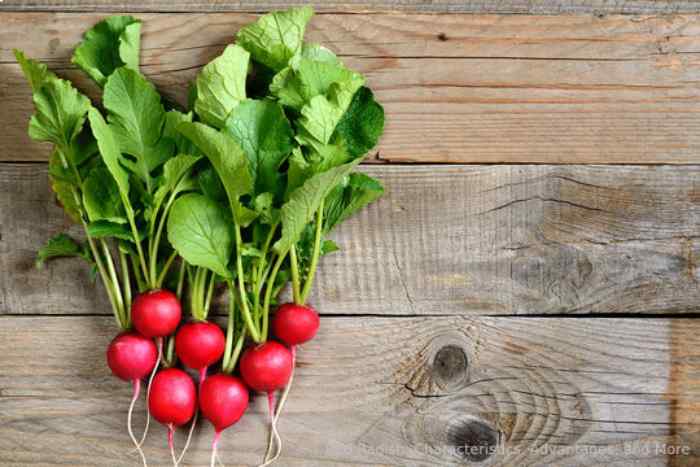You can consume a portion of the root of the red radish plant, which is available at the same-named Gadssupermarkets. They are categorized as vegetables and are available in various shapes. Some of them are spherical, while others resemble carrots in appearance but are often more rounded and pointy. We will now go through the advantages and attributes of red radish.
A salad is the most typical method to consume them. They are delightful yet have a peppery flavor. They adapt to various combinations because they don’t “monopolize” the recipe in terms of taste.
The Red Radish’s Properties, Great For Losing Weight.
Because it contains more than 94% water, radish is a good food for weight reduction. It facilitates digestion, is necessary for many bodily functions, and makes it easier to feel satisfied without consuming much food.
Only 0.6% of radish is protein, and only 0.54% is fat (100 grams provide 20 calories). The 1.6% fiber and over 4% carbohydrate content stand out among the other nutrients in this food. If you still want a light, healthful, and satisfying salad, this is the best option.
Potassium, calcium, and a trace quantity of magnesium, phosphorus, iron, zinc, selenium, copper, and sodium are abundant in radishes. In addition, they are rich in numerous vitamins, including C and B9, as well as trace levels of other B vitamins.
Advantages Of Radish
Anthocyanin, a red pigment in plants, gives them a red hue. In the body, it transforms into a potent antioxidant that guards against cell damage and wards off cardiovascular disease. They also offer indole-3-carbinol (I3C), a chemical that lessens inflammation.
Additionally a fantastic provider of potassium and radishes. By functioning as a diuretic, this mineral encourages a healthy water balance in the body. Red radishes also have a powerful cleansing effect on the liver by promoting bile production.
Is It Bad To Eat A Radish Portion?
The diuretic effects of radish increase urine output. However, excessive consumption might cause dehydration and excessive water loss. We’re talking about massive volumes that are uncommon to consume. They are not advised for pregnant women or those with gallstones since they can lower blood pressure.
They are crisp, juicy, and just picked. Go nicely with tacos, sautéed with lemon and tagine. Radishes are beautiful, and, of course, we adore them. We can find them all across Mexico.
But did you know that besides being plentiful and adaptable, they also offer several advantages and disadvantages you should consider before resuming their consumption? Here, we outline the critical information you should be aware of.
The Nutritional Values
In addition to having extremely few calories, radish gives our bodies a wide variety of nutrients. For instance, there are 3.4 grams of carbs, 1.6 grams of fiber, 1.86 grams of sugars, 1 gram of protein, 0.1 grams of fat, and between 16 and 17 calories in 100 grams of raw radish.
Vitamins C, complex B, K, potassium, sodium, calcium, phosphorus, magnesium, iodine, iron, and zinc are also present.
The following are some advantages associated with this tuber, of which just the leaves are often consumed:
- Liver health
- Gallstones removal
- Ease of food digestion.
- Better functioning of the cardiovascular system.
- Reduction in blood pressure.
- Dieting to lose weight because of the few calories it provides
- Strengthening the immune system.
- It’s diuretic
Radish-related warnings on consumption
Despite all the advantages it provides for the improved operation of our bodies, there are some things you now need to consider. Some of them are:
People who have goiter or hypothyroidism should avoid it. The thyroid gland tends to expand. After all, it prevents the body from adequately absorbing iodine.
As it can irritate the stomach lining when ingested in excess, it frequently results in an unsettled stomach and even nausea. Allyl isothiocyanate, a substance present, is mainly blamed for it.
Radish is a great blood pressure regulator. Thus, people with low blood pressure should consume it in moderation as it might result in hypotension.
Also read:- Essential Oils for Everyday Wellness
